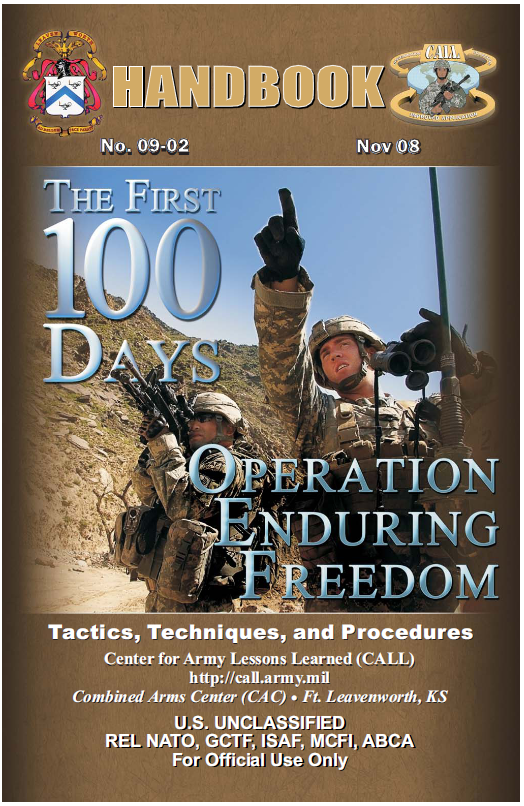Here's a great example of a Knowledge Asset created to fill a critical knowledge need.
Sometimes a KM team needs to take the lead in creating (or facilitating the creation of) a knowledge asset to fill a knowledge need. This is an example from the US Army where this was done; the Handbook called "The First 100 days".
The Center for Army Lessons Learned (CALL) is the Knowledge Management wing of the US Army, tasked with developing knowledge from operations and embedding it into guidance, training and doctrine. During the U.S.-led combat mission in Afghanistan from 2001 onwards, CALL recognised that the first 100 days of deployment were the most dangerous for soldiers and their leaders, and the time when they were most vulnerable. Knowledge of how to survive this time was held by the troops already on the ground, so CALL set out to make this knowledge available to those would would join them; creating the "First 100 days" handbook in 2008.
The handbook describes the process as follows:
"CALL’s task was to get the Soldiers’ and leaders’ perspectives and insights from their first few months of combat and determine why they survived and what factors contributed most to their survival. CALL wanted information straight from the Soldiers, in their own words. From that information, and with analysis and writing by subject matter experts, CALL developed the First 100 Days series of handbooks for Soldiers, small unit leaders, and commanders and staffs".
The series of handbooks were amalgamated into a single handbook which is now available here (and from many other sites).
The handbook is structured around the main topics, and is written as concise advice, checklists and guidance. As the book says, soldiers should
"Use this handbook to sharpen your focus (whether you are a leader, a Soldier, or a staff member) from pre-deployment through the initial 100-day period. Rather than telling you what to do, this handbook helps you assess a situation and identify ways to survive those first 100 days unscathed by combat and noncombat injuries or worse. Keep in mind that you and your unit may need to revisit the “100 Days” in part or in its entirety when shifting to a new operational area or with a change of mission.".
Lessons for the knowledge manager
Unless you are a soldier, this handbook is unlikely to be of much direct use to you, other than as a case study. However the principles are universal:
- Analyse your organisation to see where the main knowledge risks are, and the main "learning curves" for the individuals and the organisation.
- Discover where that knowledge currently resides.
- Facilitate the transfer of that knowledge. If the number of people involved is small, this can be done through face to face conversations. If there are a number of users, and there is a lot of knowledge to transfer (and if they will need to keep referring to it) then consider writing it down.
- If they will need the knowledge when out of reach of technology, then print it. If they will always be connected, then you can store it online, for example in a wiki (for constant update).





No comments:
Post a Comment